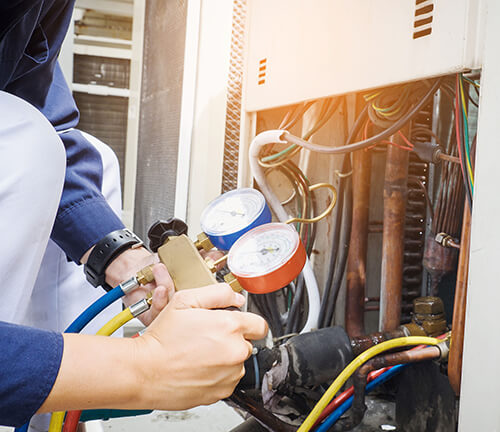Energy-Efficient A/c Solutions to Reduce Energy Costs
As power expenses continue to increase, the importance of energy-efficient Cooling and heating systems ends up being increasingly obvious. These systems not only guarantee substantial savings on energy bills however also contribute to an extra sustainable future by decreasing energy usage.
Advantages of Energy-Efficient Heating And Cooling Equipments
Energy-efficient HVAC systems provide many benefits that extend beyond simple expense financial savings. By eating less energy, these systems contribute to reduce greenhouse gas discharges, assisting to battle environment change and promote sustainability.
Additionally, energy-efficient heating and cooling systems usually supply enhanced comfort levels. Much of these systems feature advanced technology that permits better temperature control and improved air quality (DMAKS HVAC). This results in a much healthier interior environment, which is especially essential for individuals with allergies or respiratory concerns
In addition, investing in energy-efficient cooling and heating systems can enhance building value. As even more consumers focus on energy effectiveness, homes and buildings equipped with these systems might bring in greater quotes in the realty market.
Kinds Of Energy-Efficient HVAC Options
Just how can home owners and services choose the most ideal energy-efficient cooling and heating choices for their requirements? The market provides a variety of energy-efficient HVAC systems, each made to boost comfort while decreasing energy consumption.
One alternative is the variable refrigerant circulation (VRF) system, which effectively controls the temperature level in several zones within a structure. This system adapts its cooling agent flow to match the wanted temperature, leading to substantial energy financial savings.
One more preferred option is geothermal heatpump, which make use of the earth's secure temperature to warmth and amazing rooms. By transferring warmth to and from the ground, these systems demonstrate remarkable effectiveness, particularly in modest climates.
Furthermore, ductless mini-split systems provide an energy-efficient option for homes doing not have ductwork. These systems permit zone-specific cooling and heating, reducing power waste in vacant locations.
Lastly, high-efficiency heating systems and ac unit, with sophisticated SEER and AFUE rankings, provide trusted climate control while taking in much less power than conventional designs. By reviewing these options, house owners and organizations can select a cooling and heating system tailored to their particular requirements and power performance objectives.
Key Functions to Take Into Consideration

Next, explore the type of compressor made use of in the system. DMAKS HVAC. Variable-speed compressors can change their result to match the heating or cooling down demand, bring about enhanced convenience and energy financial savings compared to single-speed versions. In addition, look for systems outfitted with smart thermostats that use programmable settings and remote gain access to, enabling much better control over power consumption
An additional critical feature is the system's air filtration capability. High-efficiency filters can improve indoor air quality and decrease energy consumption by guaranteeing the system operates efficiently. Additionally, think about the kind of cooling agent utilized; contemporary systems typically utilize green cooling agents that have a reduced ecological effect.
Last but not least, make certain that the system is suitable with zoning innovation, which enables customized temperature level control in various areas of your home, enhancing convenience while lessening energy use.
Tips for Picking the Right System

Following, think about energy efficiency rankings, especially the Seasonal Power Effectiveness Ratio (SEER) for cooling down systems and the Yearly Fuel Usage Efficiency (AFUE) for heating unit. Greater ratings indicate better effectiveness, have a peek here which can result in significant financial savings on utility bills with time.
In addition, examine the sort of HVAC system that ideal fits your lifestyle and spending plan. Choices include main air conditioning, ductless mini-splits, and warm pumps, each with its own collection of advantages and drawbacks.
Do not ignore the significance of proper installment and sizing; an improperly sized system can bring about inefficiencies and boosted wear. Consult with an expert HVAC specialist to obtain skilled recommendations tailored to your home's one-of-a-kind requirements. This thorough approach will make certain that you select an energy-efficient a/c system that fulfills your needs and budget plan properly.
Maintenance for Optimal Effectiveness
As soon as the right heating and cooling system remains in area, ongoing maintenance ends up being vital to ensuring optimal effectiveness and durability. A properly maintained system operates better, causing reduced power usage and reduced utility expenses. Routine assessments and tune-ups need to be scheduled a minimum of twice a year-- once before the cooling season and once before the heating season.

Home owners must likewise be attentive about monitoring their HVAC system's efficiency. Uncommon sounds, fluctuating temperatures, or boosted energy bills can show underlying concerns that need prompt focus. By resolving these worries promptly, property owners can protect against pricey repair work and extend the life-span of click over here their systems.
Investing in an upkeep plan with a qualified service technician not only boosts performance yet additionally gives assurance, knowing that the system is running at its finest. DMAKS HVAC. Routine upkeep is as a result important for sustaining energy efficiency and decreasing general operational prices
Verdict
Finally, energy-efficient a/c systems provide a feasible solution for lowering energy expenses while boosting convenience and air high quality. By incorporating innovative modern technologies and options such as geothermal heatpump and ductless mini-splits, residential property owners can attain substantial energy cost savings and add to environmental sustainability. Careful consideration of system features and ongoing upkeep further guarantees ideal performance, making energy-efficient systems a sensible click here for more info financial investment for both economic and environmental benefits.